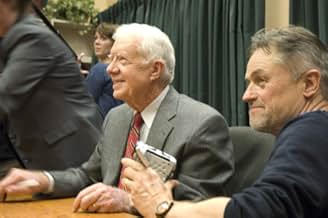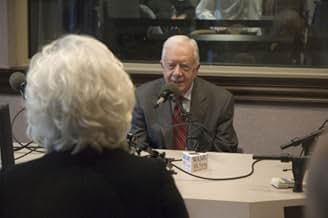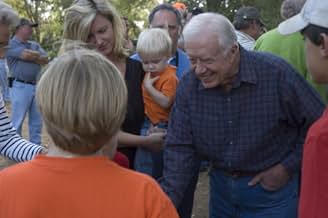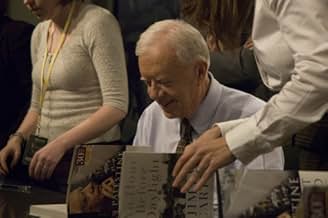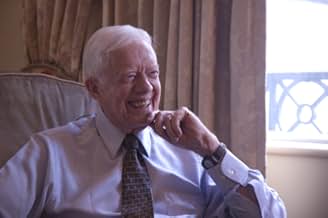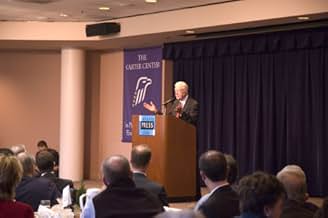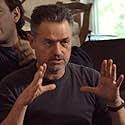Ajouter une intrigue dans votre langueA chronicle of the former president's tour recent for his book "Palestine: Peace Not Apartheid."A chronicle of the former president's tour recent for his book "Palestine: Peace Not Apartheid."A chronicle of the former president's tour recent for his book "Palestine: Peace Not Apartheid."
- Prix
- 3 victoires et 3 nominations au total
Lillian Carter
- Self
- (archive footage)
Avis en vedette
Jonathan Demme's documentary follows Jimmy Carter on the tour for his book "Palestine: Peace Not Apartheid", an extremely controversial book for many reasons, not the least of which is the choice of the word "Apartheid".
I'm not going to talk about that controversy because I don't think it has much to do with what I took away from this film. Like Demme's film "Cousin Bobby", this is a film about a man who takes his Christianity and his obligation to his fellow man very seriously, and really puts his beliefs into action. I think it's impossible to come away from this without a deep admiration for Carter whether you agree with him about the Middle East or not. He's a smart, humble and very even-tempered man and I hope to have even 1/4 of his energy when I'm his age.
I'm not going to talk about that controversy because I don't think it has much to do with what I took away from this film. Like Demme's film "Cousin Bobby", this is a film about a man who takes his Christianity and his obligation to his fellow man very seriously, and really puts his beliefs into action. I think it's impossible to come away from this without a deep admiration for Carter whether you agree with him about the Middle East or not. He's a smart, humble and very even-tempered man and I hope to have even 1/4 of his energy when I'm his age.
"Jimmy Carter: Man from Plains" is not a biography of the 39th President of the United States; nor is it a chronicle of his time as President, or even of his work with Habitat for Humanities, though both are touched upon in the course of the film. Rather it is a documentary account of a national book tour Carter conducted in late 2006 to promote his controversial and provocatively entitled tome, "Palestine: Peace Not Apartheid." Carter basically gives two reasons why he felt compelled to write the book: 1) the fact that there had been no peace talks between the Israelis and the Palestinians in the then- five or six years of the Bush administration, and 2) what he sees as the unfair treatment of the Palestinians who live in the West Bank and the Gaza Strip.
Anyone daring (or foolish) enough to venture into this minefield of a topic risks detonating intense passions on both sides of the conflict, but Carter's history and reputation as a peacemaker between the two aggrieved parties would appear to give him some cover on the issue. Well, not exactly, for we see many, mostly pro-Israeli groups and individuals, protesting and challenging him as he travels around the country providing interviews on this hyper-sensitive subject.
As a movie, "Jimmy Carter: Man From Plains" is no more than serviceable, even though it comes with an impressive pedigree, namely Jonathan Demme for a director. It is obviously sympathetic to Carter's position and it nicely illustrates the basic decency and humanity of a man who has hit the pinnacle of power yet still manages to remain true to the small town values of humility and service on which he was raised. But it's also unimaginative and redundant and probably isn't going to do much to assuage the concerns of those who hold opposing views to his.
It's worth seeing for its historical significance though.
Anyone daring (or foolish) enough to venture into this minefield of a topic risks detonating intense passions on both sides of the conflict, but Carter's history and reputation as a peacemaker between the two aggrieved parties would appear to give him some cover on the issue. Well, not exactly, for we see many, mostly pro-Israeli groups and individuals, protesting and challenging him as he travels around the country providing interviews on this hyper-sensitive subject.
As a movie, "Jimmy Carter: Man From Plains" is no more than serviceable, even though it comes with an impressive pedigree, namely Jonathan Demme for a director. It is obviously sympathetic to Carter's position and it nicely illustrates the basic decency and humanity of a man who has hit the pinnacle of power yet still manages to remain true to the small town values of humility and service on which he was raised. But it's also unimaginative and redundant and probably isn't going to do much to assuage the concerns of those who hold opposing views to his.
It's worth seeing for its historical significance though.
Set primarily along the signing tour of his latest controversial book, Jimmy Carter Man from Plains takes us inside the private life of the much maligned 39th President of the United States.
Politics aside, it is a well made and enjoyable two hours. Most enjoyable were the few occasions that showed the ex-Prez at home in Plains or interacting with makeup artists, town people at a BBQ, or on set prior to being on the air.
The documentary primarily deals with talking about his choice to use the word "Apartheid" in the title and charges of anti-Semite stances in the book, of which Carter fervently disagrees.
The documentary is not by any stretch a thorough commentary on Carter's presidency or political takes, it is more a one month "slice of life" of a very active, 83 year old ex-President that still is trying to remain relevant some 27 years out of office.
I highly recommend it even if you are not a big Carter supporter. It is not often that we get the chance to ride along with a President, or ex- President, and it was an enjoyable and informative ride!
Politics aside, it is a well made and enjoyable two hours. Most enjoyable were the few occasions that showed the ex-Prez at home in Plains or interacting with makeup artists, town people at a BBQ, or on set prior to being on the air.
The documentary primarily deals with talking about his choice to use the word "Apartheid" in the title and charges of anti-Semite stances in the book, of which Carter fervently disagrees.
The documentary is not by any stretch a thorough commentary on Carter's presidency or political takes, it is more a one month "slice of life" of a very active, 83 year old ex-President that still is trying to remain relevant some 27 years out of office.
I highly recommend it even if you are not a big Carter supporter. It is not often that we get the chance to ride along with a President, or ex- President, and it was an enjoyable and informative ride!
Depending on your political proclivities, those expecting a full-blown biopic of the 39th President of the United States will be either severely disappointed that it focuses primarily on his 2006/7 book signing tour, or exhilarated that it is not a two-hour Biography Channel special of his life's highlights. Filmmaker Jonathan Demme ("Silence of the Lambs", "Philadelphia") is no stranger to the demands of the documentary format, although his previous efforts have been concert films, 1984's "Stop Making Sense" with the Talking Heads and 1998's "Storefront Hitchcock" with English singer Robyn Hitchcock. This time, he and cinematographer Declan Quinn followed Jimmy Carter, spry and fit for 83, on his extensive tour to promote his controversial 2006 bestseller, "Palestine: Peace Not Apartheid" about the indignities faced by Palestinians living in the Occupied West Bank and Gaza Strip. The book's deliberately provocative title was designed to spark discussion, and the thrust of the 2007 film is to show the media-intensified firestorm Carter faced as a result.
To his immense credit, Demme lets Carter speak for himself in the film and doesn't allow a narrator to provide color commentary on the former president's hectic touring schedule. What comes across is a man rightfully proud of the 1978 Camp David Accords between Israel and Egypt, and has most recently taken to heart his sense of responsibility as a private citizen and former leader to share the devastation he has seen the Palestinians experience in the occupied areas cut off from the rest of the world. It's an arc that Demme explores through an effective use of archival footage, interviews with key figures (including Carter's wife of 62 years, Rosalynn, who speaks movingly about what led Menachem Begin to sign the final treaty), and the robust, even-keeled presence Carter maintains throughout despite what seems to be a dizzying pace and the consistent critical onslaught. Much of Carter's politic demeanor can be attributed to his faith, including nightly Bible readings with Rosalynn (no matter where he is), but Demme also shows the discipline Carter employs with his handlers and in his regular regimen of swimming laps.
It's definitely a favorable impression of the former president, which is unlikely to sit well with detractors who view him as a treasonous rabble-rouser, but the effect is understandable given that some of Carter's more vocal opponents refused to be filmed, including Dr. Kenneth Stein, who resigned as a Carter Center fellow (of whom Carter dismissed as an absentee member), and a roomful of protesting rabbi elders in Phoenix. Fortunately, renowned Harvard professor and attorney Alan Dershowitz is included as one of the most vocal opponents of Carter's book. His fair-minded comments provide a critical counterbalance to the positive image of Carter, and interestingly, it is never really explained why Carter would not face Dershowitz in a public debate at Brandeis University, who initially turned down Carter's proposal to lecture for free. Intriguingly, Demme takes a behind-the-scenes approach to the various media interviews, whether it's Terry Gross, Charlie Rose, Wolf Blitzer, or Tavis Smiley. In turn, Carter expertly modulates his points to fit the format, including an amusingly deadpan confession to Jay Leno on who really wears the pants in the Carter marriage.
Demme also incorporates the other key priorities in Carter's life to provide more dimension to the portrait - his dedicated work on Habitat for Humanity and as caretaker of the land his family has owned for nearly two centuries around Plains. The parts of the film that drag unnecessarily are more logistical in nature traveling repeatedly with his kowtowing Simon & Schuster publicist and preparing the customers for the book signings. At 125 minutes, the film runs a mite long and could have benefited from another editing session. Extras are plentiful on the 2008 DVD starting with over thirty minutes of additional scenes and a half-hour featurette on the making of the soundtrack. Neither feels essential though an extended sequence showing a signing at Costco brought out a perturbed woman who tersely told Carter he should be tried for treason. Demme and producer Neda Armian also contribute a very thoughtful commentary track. Trailers for ten other Sony Classics films on DVD complete the extras.
To his immense credit, Demme lets Carter speak for himself in the film and doesn't allow a narrator to provide color commentary on the former president's hectic touring schedule. What comes across is a man rightfully proud of the 1978 Camp David Accords between Israel and Egypt, and has most recently taken to heart his sense of responsibility as a private citizen and former leader to share the devastation he has seen the Palestinians experience in the occupied areas cut off from the rest of the world. It's an arc that Demme explores through an effective use of archival footage, interviews with key figures (including Carter's wife of 62 years, Rosalynn, who speaks movingly about what led Menachem Begin to sign the final treaty), and the robust, even-keeled presence Carter maintains throughout despite what seems to be a dizzying pace and the consistent critical onslaught. Much of Carter's politic demeanor can be attributed to his faith, including nightly Bible readings with Rosalynn (no matter where he is), but Demme also shows the discipline Carter employs with his handlers and in his regular regimen of swimming laps.
It's definitely a favorable impression of the former president, which is unlikely to sit well with detractors who view him as a treasonous rabble-rouser, but the effect is understandable given that some of Carter's more vocal opponents refused to be filmed, including Dr. Kenneth Stein, who resigned as a Carter Center fellow (of whom Carter dismissed as an absentee member), and a roomful of protesting rabbi elders in Phoenix. Fortunately, renowned Harvard professor and attorney Alan Dershowitz is included as one of the most vocal opponents of Carter's book. His fair-minded comments provide a critical counterbalance to the positive image of Carter, and interestingly, it is never really explained why Carter would not face Dershowitz in a public debate at Brandeis University, who initially turned down Carter's proposal to lecture for free. Intriguingly, Demme takes a behind-the-scenes approach to the various media interviews, whether it's Terry Gross, Charlie Rose, Wolf Blitzer, or Tavis Smiley. In turn, Carter expertly modulates his points to fit the format, including an amusingly deadpan confession to Jay Leno on who really wears the pants in the Carter marriage.
Demme also incorporates the other key priorities in Carter's life to provide more dimension to the portrait - his dedicated work on Habitat for Humanity and as caretaker of the land his family has owned for nearly two centuries around Plains. The parts of the film that drag unnecessarily are more logistical in nature traveling repeatedly with his kowtowing Simon & Schuster publicist and preparing the customers for the book signings. At 125 minutes, the film runs a mite long and could have benefited from another editing session. Extras are plentiful on the 2008 DVD starting with over thirty minutes of additional scenes and a half-hour featurette on the making of the soundtrack. Neither feels essential though an extended sequence showing a signing at Costco brought out a perturbed woman who tersely told Carter he should be tried for treason. Demme and producer Neda Armian also contribute a very thoughtful commentary track. Trailers for ten other Sony Classics films on DVD complete the extras.
Perhaps this should have been entitled 'The President and His Book' because most of the documentary is about the book tour that Jimmy Carter took when he published his controversial book 'Palestine: Peace Not Apartheid'. We follow Jimmy as he crosses the U.S. to promote his book. Nevertheless we get a very candid and close-up view of this ex-President. He comes off very well - an honest, forthright individual who has accomplished much since he left the Presidency in 1980. Compared to the last 8 years (2000-08), here is man who can express his feelings and fears. I couldn't help but feel as I was watching, that if another, less well known individual had written the same book, the media up-roar over it would have been far less pronounced.
Le saviez-vous
- AnecdotesThe film's Director's Statement by its director Jonathan Demme reads: "I have always held President Carter [Jimmy Carter] in high esteem, so I leapt at the opportunity to do a documentary portrait of him. I chose the book tour of Palestine Peace Not Apartheid as the backbone of the documentary before reading the book. I knew that with the kind of subject matter promised by the title, there would probably be a lot of fireworks on that journey. I love how his un-self-censored behavior and attitudes help reveal how authentic and deep President Carter's faith-based motivation really is - and how terrifically complicated he is as a human being, with such an active sense of humor, an encyclopedic knowledge of a seeming endless array of subjects - and how super-sensitive yet bold, feisty and obstinate he can be at times - and that he reveals how a devoted, adoring husband like him fits so organically with the fellow who "loves the ladies." Every time I see this film, President Carter makes me believe that - as frightening and appalling as so many things are in the world today - that there is nevertheless a very real possibility for peace and better lives for future generations if we strive to somehow get along and if we aspire to defining the upside of being human."
Meilleurs choix
Connectez-vous pour évaluer et surveiller les recommandations personnalisées
Détails
- Date de sortie
- Pays d’origine
- Sites officiels
- Langue
- Aussi connu sous le nom de
- Jimmy Carter: Man from Plains
- sociétés de production
- Consultez plus de crédits d'entreprise sur IMDbPro
Box-office
- Brut – États-Unis et Canada
- 108 807 $ US
- Fin de semaine d'ouverture – États-Unis et Canada
- 10 413 $ US
- 28 oct. 2007
- Brut – à l'échelle mondiale
- 119 263 $ US
- Durée
- 2h 5m(125 min)
- Couleur
- Mixage
- Rapport de forme
- 1.85 : 1
Contribuer à cette page
Suggérer une modification ou ajouter du contenu manquant







